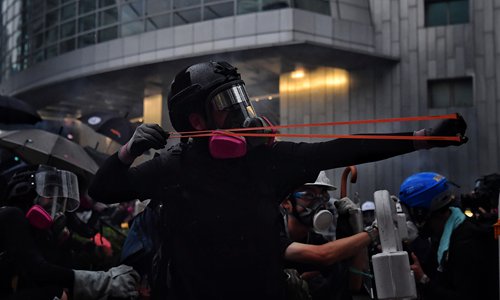HOME >> OPINION
As HK festers, questions aplenty for the West
By Wang Wenwen Source:Global Times Published: 2019/8/28 13:43:40

A radical protester in Hong Kong Photo: AFP
Young, angry, anti-establishment, and violent. How can they be defined? Rioters or heroes? It depends on what they oppose. If they are against Western mainstream society, they are villains. But if they are against non-Western authority, their actions would perfectly fit a pro-democracy narrative, all too often exploited by certain Western forces and Western media outlets in their public opinion offensive against their ideological opponents.
Hong Kong of this summer will surely be remembered by Western media reporters. When black-clad youngsters took to the streets and ganged up to beat the police and destroy public property, they were hailed as heroes and fighters for the city's law, freedom and democracy.
On We the People petition page which is a part of the White House website, a petition by more than 100,000 netizens calls for the Nobel Peace Prize 2020 to be given to the "Hong Kong freedom fighters."
Indeed, the protesters are being looked at through Western prism. They are on the frontlines of modern-day changes for the so-called betterment of their society. Noted international affairs commentator George Friedman once pointed out, "For the Western media, anyone under the age of 30 with an iPhone is by definition a liberal democrat."
But when protesters in Hong Kong vandalize subway station facilities, cut off smart lampposts, damage the cross-harbor tunnel, threaten passengers and resort to dangerous weapons including Molotov cocktails, how could the West endow them with the halo of peace?
During the months-long protests, Hong Kong police have been portrayed by certain Western media as a brutal force out to get civilians and protesters, even though it was the protesters who first broke the law and resorted to violence.
But when such protests turn into riots in Western countries, how would the police do? The French police used tear gas and water cannons to disperse the yellow-vest protesters that swept across Paris even before the situation could spiral out of control, but Western media took it for granted when reporting it without much condemnation of the same kind of "brutality."
By the same logic, while police in Moscow detained more than 1,300 people during a rally on July 27, it isn't surprising that France and Germany criticized Russia's "excessive" use of force.
What is happening in Hong Kong now provides a perfect story for the West to chant its Western-style democracy and push forward its ideological campaigns. The protesters and some Westerners do share a lot of values, and the West has various channels to support them. This is the tactic the West uses to expand its discourse power.
Many Western politicians have joined the campaign. US Representative Jim McGovern, a Democrat, called for US action such as stopping arms sales and riot control equipment to the Hong Kong Police Force. Former US secretary of state Hillary Clinton once tweeted, "May we all stand in solidarity with the people of Hong Kong as they speak out for democracy, freedom from repression, and a world they long to see."
But is this the world all of Hong Kong people long to see, or one some US politicians long to see? As netizens commented on Hillary Clinton's tweet on Hong Kong, the US stood in solidarity with Syria, Libya, Yemen and Iraq, and look what has become of these countries? Joseph Micallef, a commentator on military and international affairs, wrote in HuffPost that the US encouragement of the Arab Spring only served to destabilize the region even more. We see economic stagnation, political violence, bloody civil war and widespread unrest. Instead of enjoying the US-hailed democracy and freedom, people from these countries are still suffering, and the US behaves like every such misadventure has nothing to do with it.
So, will Hong Kong with support from the US-led West be an exception? Hardly. The US has already sought to use the Hong Kong protests as a bargaining chip in its strategic game with China. Hong Kong's special customs status with the US is also under threat from Washington. Hong Kong protesters may ask those Western politicians if the latter really treat them as advocates of peace or merely political tools.
The author is a reporter with the Global Times. wangwenwen@globaltimes.com.cn
RELATED ARTICLES:
- The truth about Hong Kong’s autonomy
- China voices firm opposition to G7 statement on Hong Kong
- Hong Kong organization offers reward for help in catching violent protesters
- 883 protesters arrested as Hong Kong police face escalating violence
- Demonstration staged in Hong Kong against US interference in China's domestic affairs
Posted in: VIEWPOINT